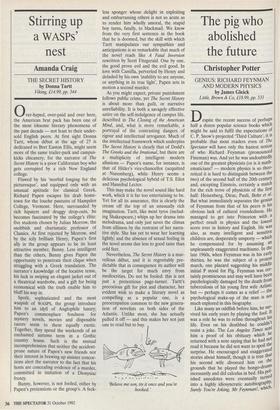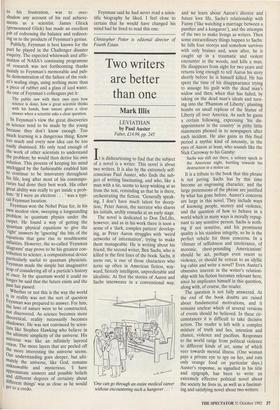The pig who abolished the future
Christopher Potter
GENIUS: RICHARD FEYNMAN AND MODERN PHYSICS by James Gleick Little, Brown & Co, £18.99, pp. 531 Despite the recent success of perhaps half a dozen popular science books which might be said to fulfil the expectations of C. P. Snow's projected 'Third Culture', it is probable that most readers even of The Spectator will have only the haziest notion of who Richard Feynman (pronounced Fineman) was. And yet he was undoubtedly one of the greatest physicists (or is it math- ematicians? — modern physics is so theo- retical it is hard to distinguish between the two) of the second half of the 20th century and, excepting Einstein, certainly a match for the rich trove of physicists of the first half: Heisenberg, Dirac, Pauli, Bohr et al. But what immediately separates the genius of Feynman from that of his peers is his obvious lack of cultural roundedness. He managed to get into Princeton with a perfect result in physics and the lowest score ever in history and English. He was also, as many intelligent and sensitive children are, desperately unsporty — which he compensated for by assuming an unpleasantly exaggerated machismo. In the late 1960s, when Feynman was in his early thirties, he was the subject of a protest march, one placard suggesting his middle initial P stood for Pig. Feynman was cer- tainly promiscuous and may well have been psychologically damaged by the death from tuberculosis of his young first wife Arline; but — perhaps it comes as a relief — the psychological make-up of the man is not much explored in this biography. Like many an oddfish before him, he sur- vived his early years by playing the fool. It was a role he was to refine throughout 111s life. Even on his deathbed he couldn t resist a joke. The Los Angeles Times sent him a proof of his obituary which he returned with a note saying that he had not read it because he did not want to spoil the surprise. He encouraged and exaggerate stories about himself, though it is true that his second wife divorced him on the grounds that he played the bongo-drums incessantly and did calculus in bed. His pol- ished anecdotes were eventually turned into a highly idiosyncratic autobiography' Surely You're Joking, Mr Feynman!, which, to his frustration, was to over- shadow any account of his real achieve- ments as a scientist. James Gleick (pronounced Glick) has made an excellent job of redressing the balance and redirect mg us to the products of Feynman's genius.
Publicly, Feynman is best known for the part he played in the Challenger disaster enquiry. The expected whitewash and affir- mation of NASA's continuing programme of research was not forthcoming thanks mainly to Feynman's memorable and pub- lic demonstration of the failure of the rock- et's sealing rings, using nothing more than a piece of rubber and a glass of iced water. As one of Feynman's colleagues put it:
The public saw with their own eyes how science is done, how a great scientist thinks with his hands, how nature gives a clear answer when a scientist asks a clear question.
In Feynman's view the great discoveries in science tend to be made by the young because they don't know enough. Too much learning is a dangerous thing. Know too much and every new idea can be too easily dismissed. He only read enough of the work of other scientists to understand the problem; he would then derive his own solution. This process of keeping his mind unclogged by the fashionable enabled him to continue to be innovatory throughout his life, long after most of his contempo- raries had done their best work. His other great ability was really to get inside a prob- lem: 'If I were an electron . . . ' was a typi- cal Feynman locution. Feynman won the Nobel Prize for, in his own modest view, sweeping a longstanding problem in quantum physics under the carpet. He found a way of getting the quantum physical equations to give the right' answers by 'ignoring' the bits of the equations that gave rise to troublesome infinities. However, the so-called `Feynman diagrams' may prove to be his greatest con- tribution to science, a computational device particularly useful to quantum physicists. Feynman made the simple but imaginative leap of considering all of a particle's history at once. In the quantum world it could no longer be said that the future exists and the past has passed. Whether or not this is the way the world is in reality was not the sort of question Feynman was prepared to answer. For him, the laws of nature were to be constructed, not discovered. As science becomes more theoretical, reality necessarily becomes shadowier. He was not convinced by scien- tists like Stephen Hawking who believe in the ultimate simplicity of the universe. His universe was like an infinitely layered onion. The more layers that are peeled off the more interesting the universe seems. Our understanding goes deeper, but ulti- mately the universe, like God, remains unknowable and mysterious. 'I have approximate answers and possible beliefs and different degrees of certainty about different things' was as close as he would get to a credo. Feynman said he had never read a scien- tific biography he liked. I feel close to certain that he would have changed his mind had he lived to read this one.
Christopher Potter is editorial director of Fourth Estate.



























































 Previous page
Previous page